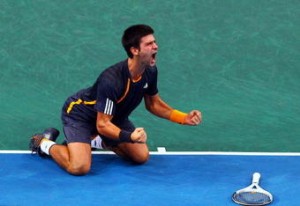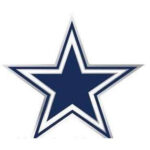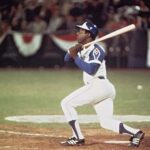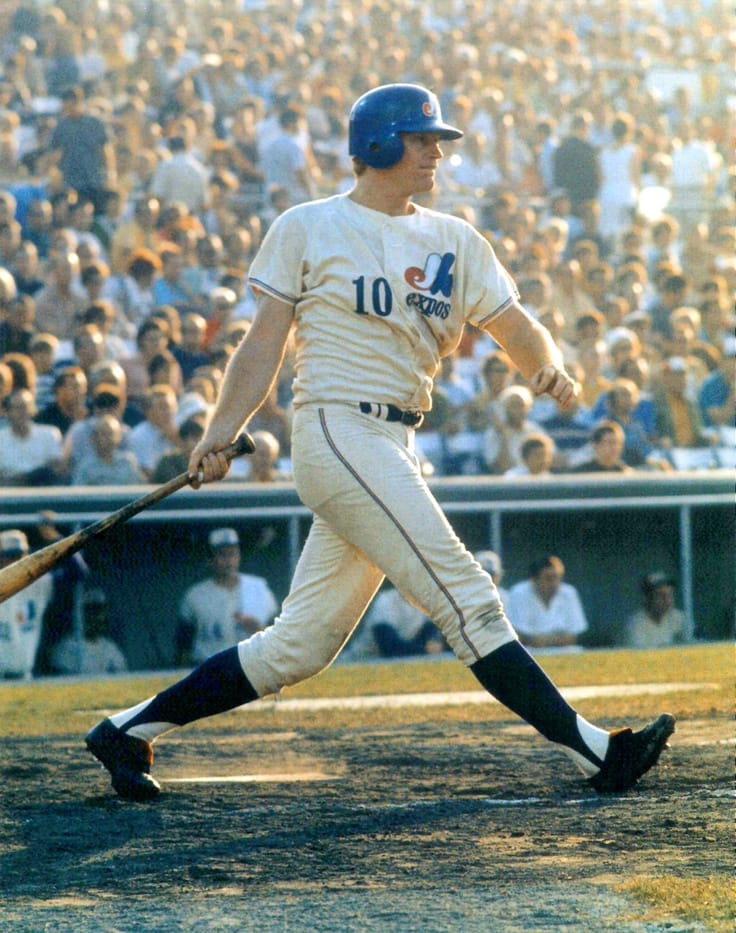Novak Djokovic: 2010 Starts Now

Novak Djokovic celebrates match point in the Final match against Gael Monfils.
How will Novak Djokovic look back on 2009?
As things stand now, it would seem a letdown from the prior year, when he captured his first major title at the 2008 Australian Open, then threw in a couple of Master’s Shields and the year-ending Master’s Cup for good measure.
In contrast with last year – and even with 2007, when he was clearly on the rise – Djokovic’s 2009 campaign bore the marks of a highly gifted young man unsure of where he belonged in the world of tennis. The Serbian, who turned 22 in May, has endured varying degrees of disappointment at this year’s majors.
His title defense in Melbourne was derailed when he withdrew due to heat exhaustion. A heartbreaking loss to Rafael Nadal in Madrid contributed to a flat third-round exit from Paris. While regaining his form at Wimbledon he was surprised by the resurgence of Tommy Haas, and even when his play (and fun-loving demeanor) had returned, it wasn’t quite enough against Roger Federer in New York.
What’s more, the solid play of fellow 22-year-old Andy Murray and the stunning rise of now 21-year-old Juan Martin del Potro made it clear that the Serb was no longer the youngest of the young guns in tennis.
But as Djokovic’s winning ways began being spoken of in past tense, the fall indoor season shows that he has not stopped believing in his own talent. While he is not the cerebral tactician that Murray is, and while he may no single shot as brutally effective as del Potro’s forehand, Djokovic is still arguably a better athlete than either. And this year he’s doing what some of us advised him last year: take advantage of the fall, when your competition has been beaten down by the rigors of the tour.
The Serbian has now won three of his last four events: Beating up-and-comer Marin Cilic in Beijing, stunning hometown favorite Roger Federer in Basel, and now winning his first Master’s Shield of the year in Paris. But for one torrid third-set tiebreak against Nikolay Davydenko in Shanghai, Nole might have made it four-for-four.
To have upset the world No. 1 in Basel’s final was impressive, but Paris may prove his loudest statement yet. After improving to 5-0 against Robin Soderling in the quarters, he handed world No. 2 Rafael Nadal a one-sided 6-2, 6-3 beating in the semis. The Spaniard still seems to be laboring in search of his best play, and the speed of Paris’ indoor courts definitely favors Djokovic’s game.
That said, there was more than a favorable surface separating the two this weekend: at one stretch, the Serbian won seven games in a row against Nadal.
In the finals, he faced a native son for the second straight week, this time world No. 16 Gael Monfils, for whom “Mercurial” would be a fitting middle name.
But Djokovic, to borrow parlance from American team sports, remains perfect on the road, having proven more consistent than Monfils in the third set finale. After falling short in four Master’s Series finals this year, Djokovic’s satisfaction with this win was palpable.
Having produced a scintillating series of results this fall, the Serb can travel down two paths: One is David’s way, the other is Marat’s.
In 2004 Marat Safin won both the Madrid and Paris Master’s shields, a feat duplicated by David Nalbandian in 2007. Both men had known sporadic results in the year leading up to those victories, which had the unintended benefit of leaving them fit when their competitors were breaking down at the end, and both had games that translated well to the indoor courts.
Safin is rarely spoken of as a good example in terms of capitalizing on one’s opportunities, but at the Australian Open in 2005 he took that momentum and put it to use, winning his second major title.
In Nalbandian’s case, the 2008 AO was a disaster, as he folded early and meekly in the third round.
Djokovic will probably conform to neither pattern exactly; he’s a very different player than both the Russian and Argentine, and has a very different temperament. If he’s looking for examples, though, Safin’s would certainly be the better route. 2009 may not have been the best year of the young Serbian’s career, but if he wins a major in 2010 – and anything short of that will be a disappointment – this year will be remembered as the time young Djokovic retooled and renewed his play.
For Djokovic, the 2010 season has already begun.










